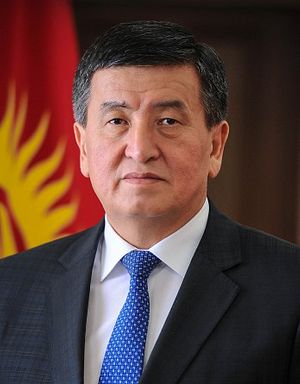Five days after being inaugurated as Kyrgyzstan’s new president on November 24, Sooronbai Jeenbekov touched down in Moscow for a working visit.
The choice of Russia as a first trip highlights the new president’s foreign policy preferences.
Jeenbekov said in his inaugural address that “Kyrgyzstan will continue to promote its strategic partnership with Russia and will bolster its strategic partnership with China.”
Aizada Subakozhoyeva, head of the presidential administration’s foreign policy department, said the country’s external political course “is aimed at developing our deepening and strengthening alliance and strategic partnership with Russia.”
This course is one set by former President Almazbek Atambayev, though back in 2011 when he took up the presidency the Russia-Kyrgyzstan relationship was in a less stable place. It’s worth revisiting Atambayev’s early presidency to contrast just how far regional politics have shifted in Russia’s favor.
In December 2011, about three weeks after being inaugurated as president, Atambayev traveled to Moscow for the CSTO Collective Security Council meeting. He met with then-President Dmitri Medvedev. The visit lacked the pomp and circumstance of a first international trip.
Atambayev’s January 2012 trip to Turkey was viewed, at the time, as a decidedly more important signal of the new Kyrgyz president’s foreign policy direction — namely diversification of partners. (Eurasianet reported it as Atambayev’s first international trip, though it came a month after the CSTO meeting in Moscow).
Russia grumbled about Atambayev. Itar-Tass carried a report that was fairly clear about where relations stood in March 2012:
Russian-Kyrgyz relations have deteriorated sharply… Russia is very dissatisfied with the policy of Kyrgyz President Almazbek Atambayev elected last October, the Vedomosti cited a high-ranking Russian official as saying to reporters on Wednesday. In February Atambayev stated about a probable shutdown of the Russian military base in Kant, though the agreement about the deployment of the military base in 2009 was extended for 49 years. “The military base did not bring much benefit,” Atambayev said. Last February the president demanded from Russia to pay off the debt for the military base at 15 million dollars and the Defence Ministry repaid the debt.
The issue of foreign military bases was at the forefront of Kyrgyz politics in 2010, with the most ire directed at the U.S. base adjacent to Manas International Airport. But Russia’s base at Kant also occasionally drew criticism. Early in his presidency, Atambayev complained that Moscow had not paid its rent for Kant. His first trip to Moscow, in February 2012, ended with him coming back to Bishkek with $15 million in overdue payments.
At the time, Eurasianet reported that the United States was coming close to an agreement to open a training center in the country’s south, a proposal Moscow was firmly against. Atambayev’s first Moscow trip did not immediately yield a change in attitude (thus the March editorial) but looking back, it marked a pivot that eventually saw through the closure of the U.S. base. Kant remains open, and this summer Atambayev said he was hoping the Russians would open a second base in southern Kyrgyzstan.
Atambayev’s final international trip as president was to Russia. Meeting with Russian President Vladimir Putin in St. Petersburg, the two reminisced about a somewhat imagined past:
Putin: Mr Atambayev, I am happy to see you, this time in St Petersburg.
I remember that your first foreign visit as the President of Kyrgyzstan back in 2012 was to Russia. Now you are completing your time in office and one of your final foreign trips as President is also to Russia. It is only a coincidence but…
Atambayev: But it is symbolic.
Symbolic indeed. “I am pleased to note that during your presidency the quality of Russia−Kyrgyzstan relations has significantly changed,” Putin continued.
Atambayev made his wishes regarding the relationship clear: “I would very much like Kyrgyzstan and Russia to maintain their relations in their current state forever, for centuries, since as you know there were attempts to destroy, dismantle these ties and take them along a different path.”
New Kyrgyz President Sooronbai Jeenbekov’s visit to Russia certainly follows the course set by Atambayev.
According to the Kremlin, Putin and Jeenbekov are set to discuss the status and future development of the full spectrum of Russian-Kyrgyz cooperation, from politics to trade, culture to military matters.
The Kremlin’s statement also said they would “exchange opinions on bilateral interaction in the framework of the Eurasian integration processes.”
Jeenbekov surely will be trying to court Russian support in Kyrgyzstan’s ongoing border feud with Kazakhstan. Whether Moscow can play peacemaker between Astana and Bishkek remains to be seen, but Russia has a decided self-interest in seeing the spat settled, as the longer the feud persists the weaker the Eurasian Economic Union project appears.

































